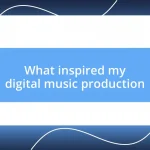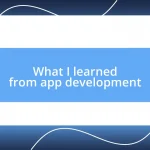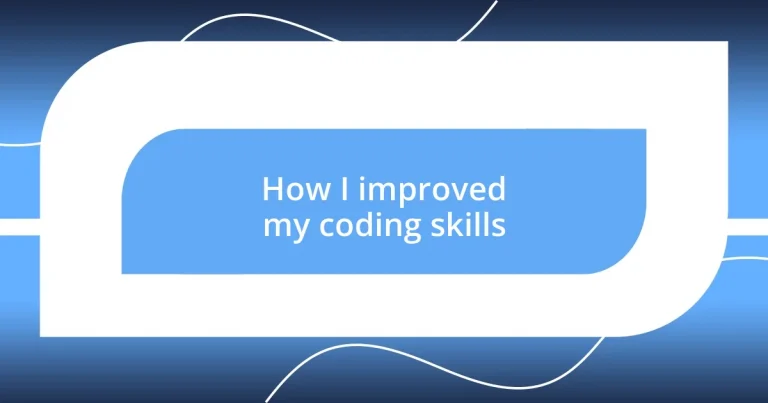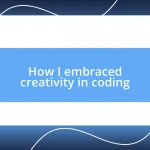Key takeaways:
- Setting clear and adjustable coding goals transformed overwhelming tasks into manageable milestones, fostering motivation and accountability.
- Choosing the right resources and engaging with coding communities provided support, diverse perspectives, and valuable feedback that enhanced learning.
- Building real projects and tracking progress through celebrations solidified skills, encouraged reflection, and propelled ongoing growth in coding abilities.
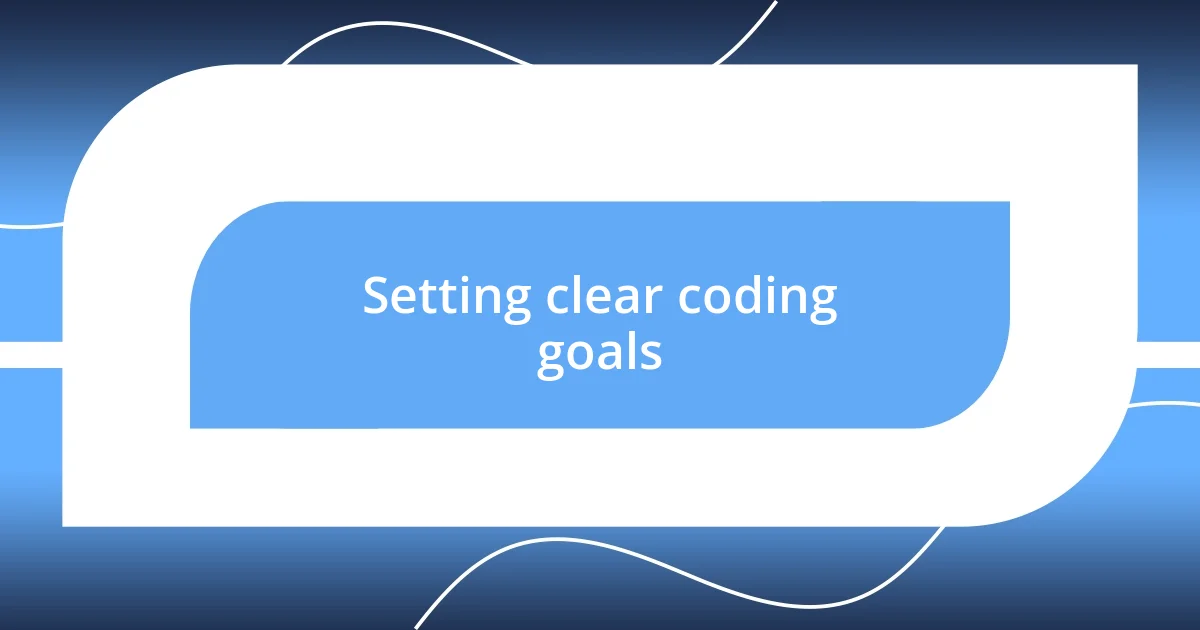
Setting clear coding goals
When I first started coding, it felt overwhelming. I remember vividly sitting in front of my computer, staring at a blank screen. It was in that moment I realized I needed to set clear goals. Just like aiming for the bullseye when playing darts, specific targets kept me focused and motivated amid the frustration.
Initially, I broke my larger aspirations into smaller milestones. For instance, instead of just wanting to “learn Python,” I specified, “I will complete one chapter of a Python book each week.” This made the process feel more manageable and less daunting. Have you ever felt that rush of achievement when you check something off your to-do list? That’s what setting clear goals did for me—it turned daunting projects into a series of smaller victories.
As I progressed, I learned that it’s equally important to review and adjust these goals regularly. I’ve had weeks where life got too busy, and coding took a backseat. Instead of feeling guilty, I’d reassess my targets; this flexibility allowed me to maintain my passion without feeling burnt out. How do you keep yourself accountable to your goals? For me, sharing my progress with fellow coders became a fantastic motivator. It was a simple acknowledgment that I wasn’t on this journey alone.
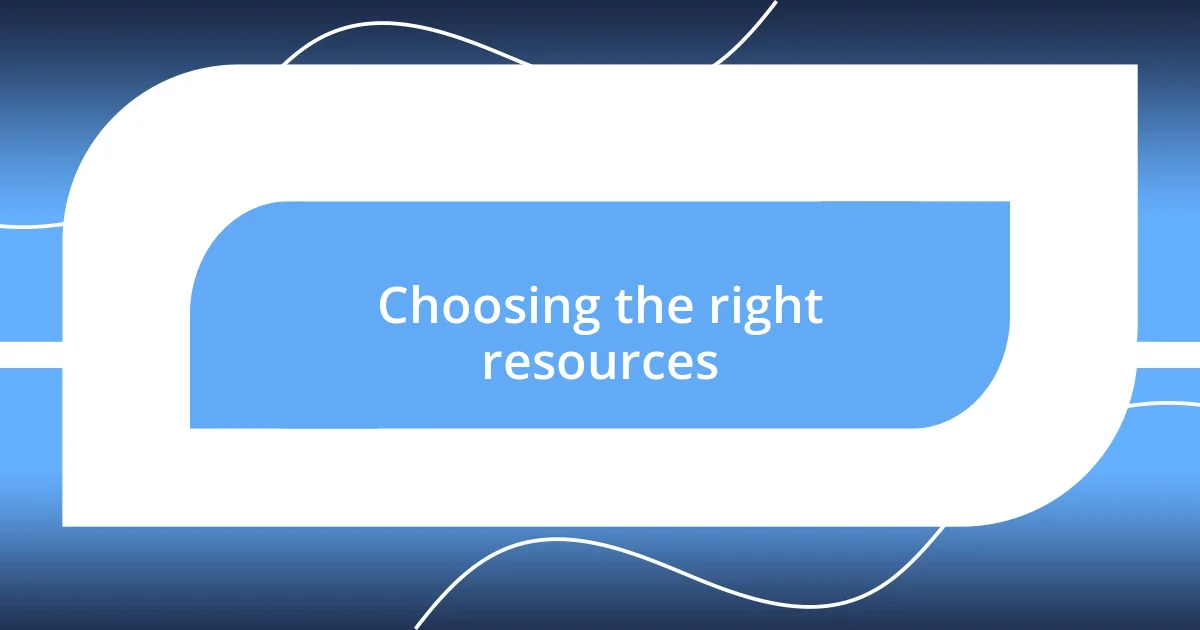
Choosing the right resources
When I started my coding journey, I quickly realized the importance of choosing the right resources. At first, I dabbled in a mishmash of tutorials, from random YouTube videos to online courses that felt more like a chore than a joy. It took me some time to figure out that the best resources aligned with my learning style. I prefer interactive learning experiences, so platforms that offered hands-on coding exercises instead of just theory worked wonders for me.
A pivotal moment came when I stumbled upon a community-driven platform where users could share their projects and receive feedback. The support I found there not only expanded my knowledge but also kept me accountable. I often compare learning resources to trying on clothes; not every style fits, but when you find the right one, it feels tailored just for you.
I think it’s crucial to remain adaptable in this journey. As I progressed, I sought more advanced materials like project-based learning and real-world challenges, which kept me engaged and excited. A wise piece of advice I picked up along the way is to regularly evaluate the effectiveness of your chosen resources. It’s like refining your coding skills—sometimes you need to debug your learning process too.
| Resource Type | Pros |
|---|---|
| Online Courses | Structured learning paths with videos and assessments |
| YouTube Tutorials | Free access to various topics, visual demonstrations |
| Interactive Coding Platforms | Hands-on practice with instant feedback |
| Books | In-depth exploration and foundational knowledge |
| Project-Based Learning | Real-world applications that boost engagement |
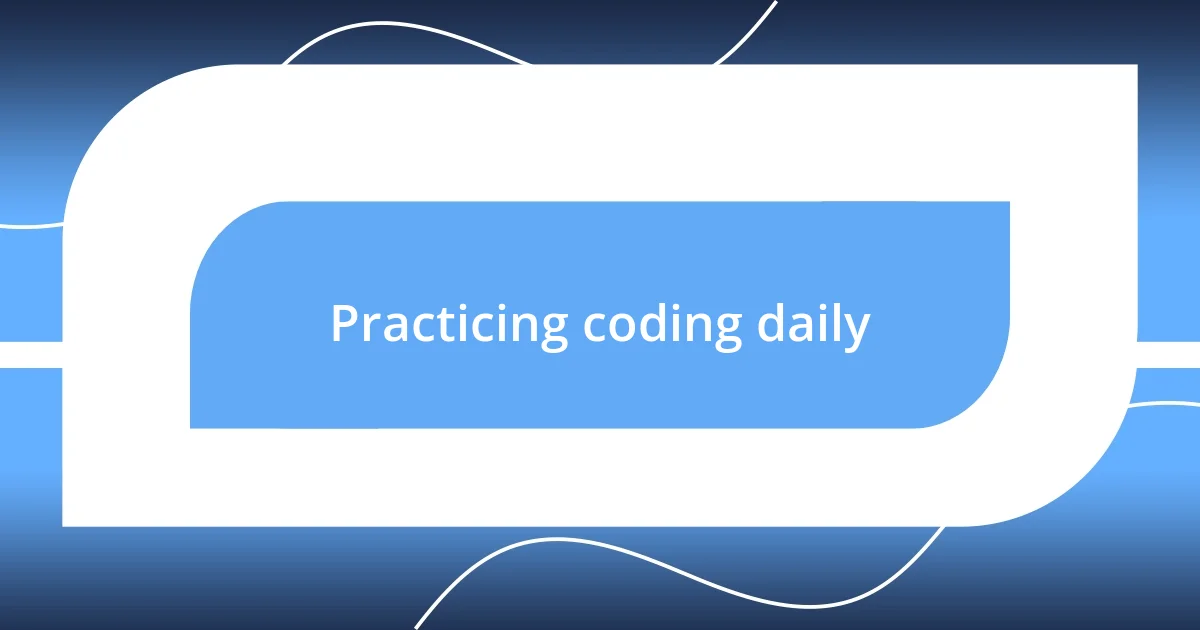
Practicing coding daily
Practicing coding daily became my game changer. I remember those early mornings when I would wake up just fifteen minutes early to squeeze in some coding before my day started. At first, it felt like a chore, but over time, those small sessions turned into cherished moments of growth. As I celebrated each accomplishment, I realized that consistency was the secret ingredient to improving my skills. Just like building a muscle, showing up every day led to significant progress in no time.
- Setting aside a specific time daily helped create a routine.
- Short, focused sessions kept my energy high and my frustration low.
- Experimenting with different coding challenges maintained my engagement.
- Participating in daily coding challenges fostered a sense of community.
- Celebrating even the smallest victories boosted my motivation and confidence.
On weekends, I would dive deeper, sometimes spending hours immersed in a project. It was during one of these marathon coding sessions that I built my first web application from scratch. I can’t describe the feeling of seeing everything come together like a puzzle; it was exhilarating! Every line of code taught me something new, and the satisfaction of solving problems kept me returning for more. When I look back, those daily practices were the little bricks that laid the foundation for my coding journey, and they transformed my initial frustration into genuine excitement. The more I practiced, the clearer my path became.
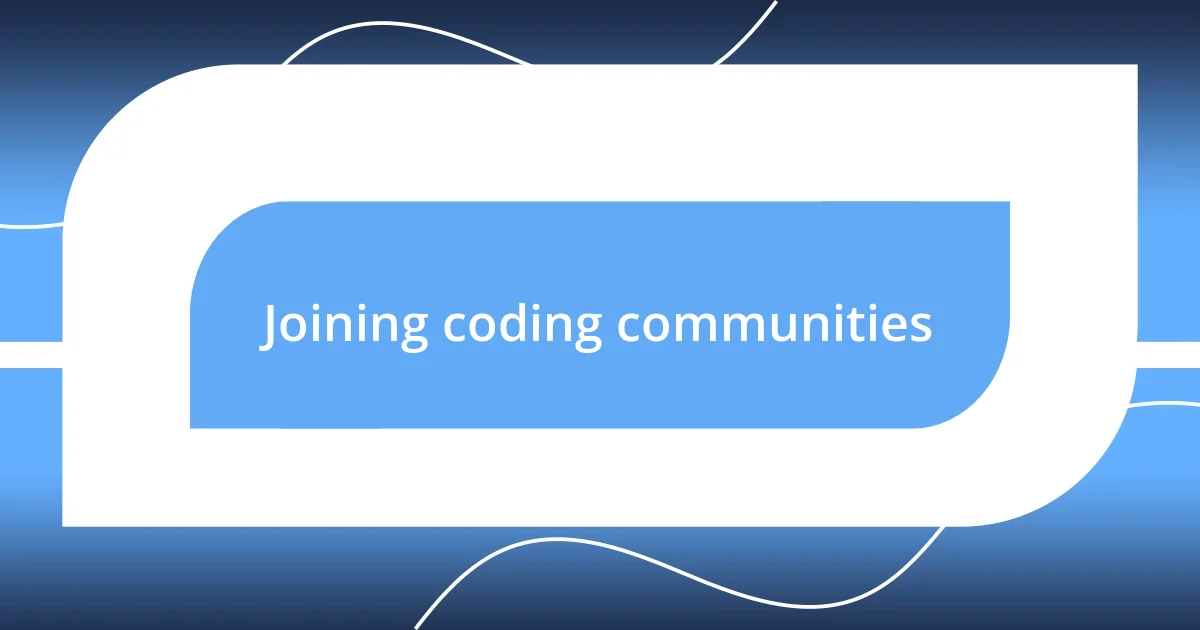
Joining coding communities
Joining coding communities has been one of the most rewarding parts of my journey. I still remember the first online forum I joined—immediately, I felt a sense of belonging and support. Have you ever experienced that rush of excitement when someone replies to your questions or validates your struggles? It’s as if you’re no longer coding in a vacuum. The collective wisdom of fellow programmers helped me navigate tricky problems that I might have spent hours troubleshooting alone.
Engaging with different communities allowed me to learn from diverse perspectives. I’ve participated in coding meetups and hackathons, where collaborating with others brought unexpected insights and ideas. Just the other day, while solving a bug in my project, a fellow coder suggested a different approach that I hadn’t considered. It was a lightbulb moment! Isn’t it fascinating how sharing knowledge can open new doors and enhance our skills?
What I appreciate most about coding communities is the genuine encouragement from peers. There were times I felt overwhelmed or doubted my abilities. However, hearing someone share their own struggles and triumphs reminded me that we’re all a work in progress. It’s this camaraderie that keeps me motivated and inspires me to push my limits. While coding can be an individual journey, the support from a community truly elevates your experience. Have you found your tribe yet? If not, I encourage you to step out and connect—it might just change the way you learn.
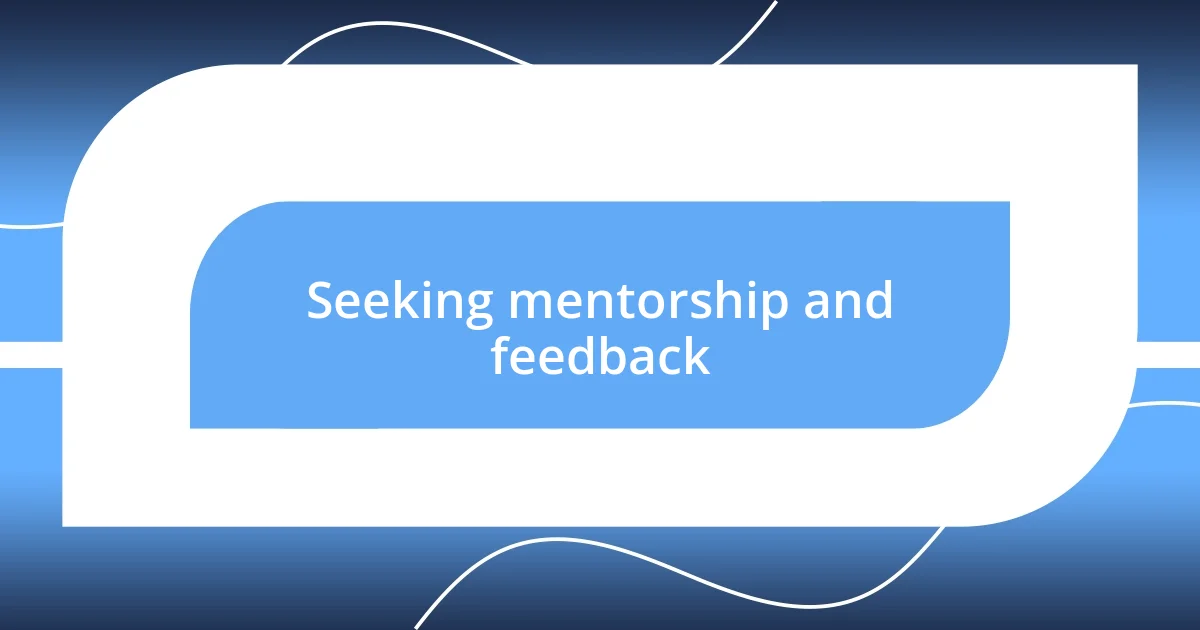
Seeking mentorship and feedback
I’ve always believed that mentorship can be a powerful catalyst for growth in any field. When I sought out a mentor, it was more than just a request for help; it was an opportunity for a two-way exchange of ideas. I still remember my first meeting with a seasoned developer who not only reviewed my code but shared personal anecdotes about his own failures and successes. Those conversations were eye-opening and made me realize that everyone, no matter how experienced, has faced hurdles.
Feedback became a lifeline during my coding journey. After presenting my project to a small group of peers, I braced myself for their critiques. I thought I had put my best foot forward, but their insights revealed grainy details I’d missed. Isn’t it amazing how a fresh pair of eyes can illuminate aspects we overlook? Those constructive comments didn’t just improve my code; they sparked a motivation in me to strive for excellence. Embracing feedback transformed my mindset from defensiveness to curiosity, allowing me to view criticism as a stepping stone rather than a setback.
Finding a mentor or seeking feedback is more than just an act; it’s a commitment to growth. Some of my most enlightening moments came from informal coffee chats with developers I admired. Have you ever had a conversation so impactful it made you see things differently? It’s during these moments that I gathered invaluable tips and encouragement, igniting a spark of determination. I encourage you to reach out to experienced professionals and ask for feedback on your work—what have you got to lose? You’ll find that sharing your journey not only helps you improve but also builds connections that can last a lifetime.
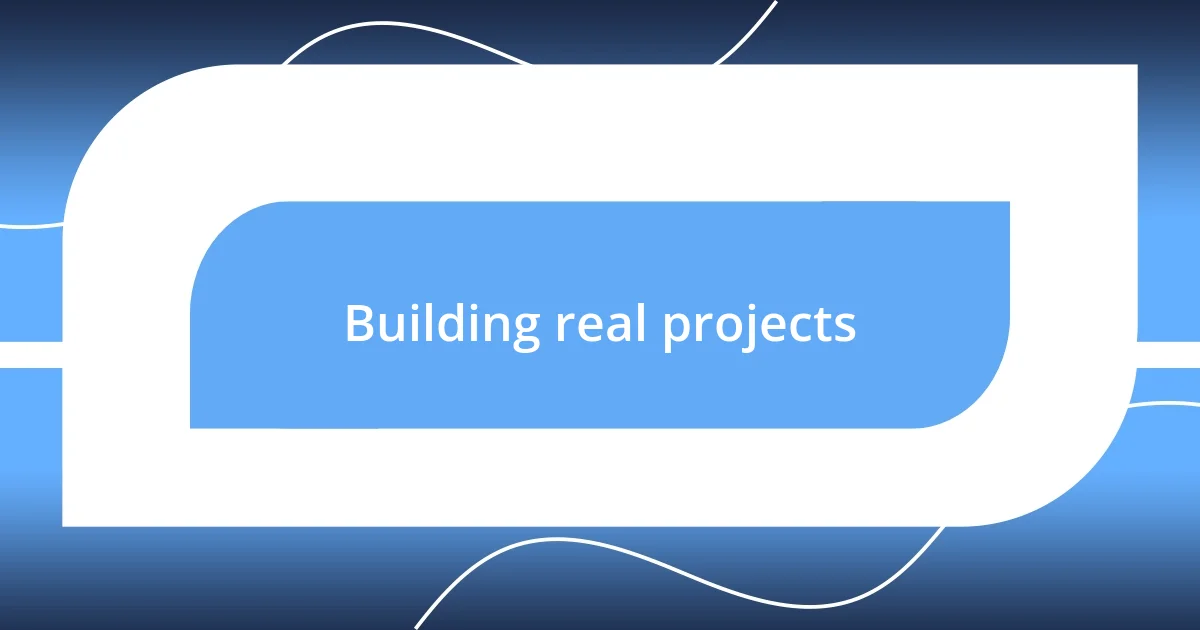
Building real projects
Building real projects has been perhaps the most pivotal aspect of enhancing my coding skills. When I started creating my first application, the thrill of seeing my code come to life was unmatched. I recall the day I finally deployed a simple weather app; the satisfaction of using my code to fetch real-time data made all those late nights worth it. Have you ever felt that rush of adrenaline when your hard work pays off?
Working on tangible projects forced me to confront real-world problems, honing both my technical abilities and problem-solving skills. I remember battling with an integration issue on a web project that seemed insurmountable. After several hours of troubleshooting and mixed emotions of frustration and determination, I discovered the solution through a combination of documentation and community advice. It’s a humbling experience, isn’t it? The reality of coding is that it often challenges us beyond our limits.
Engaging in projects also empowered me by showcasing the importance of iteration and improvement. I always believed my initial version was good enough until I learned how to collect user feedback. A friend of mine used my app and pointed out several inconsistencies. It stung at first, but that feedback ignited a desire to enhance my work. Seeing users interact with my project and finding ways to tailor it to their needs helped me understand that our work is never truly finished. Have you tried building something from scratch? I wholeheartedly encourage you to dive in—it’s an experience you won’t regret.
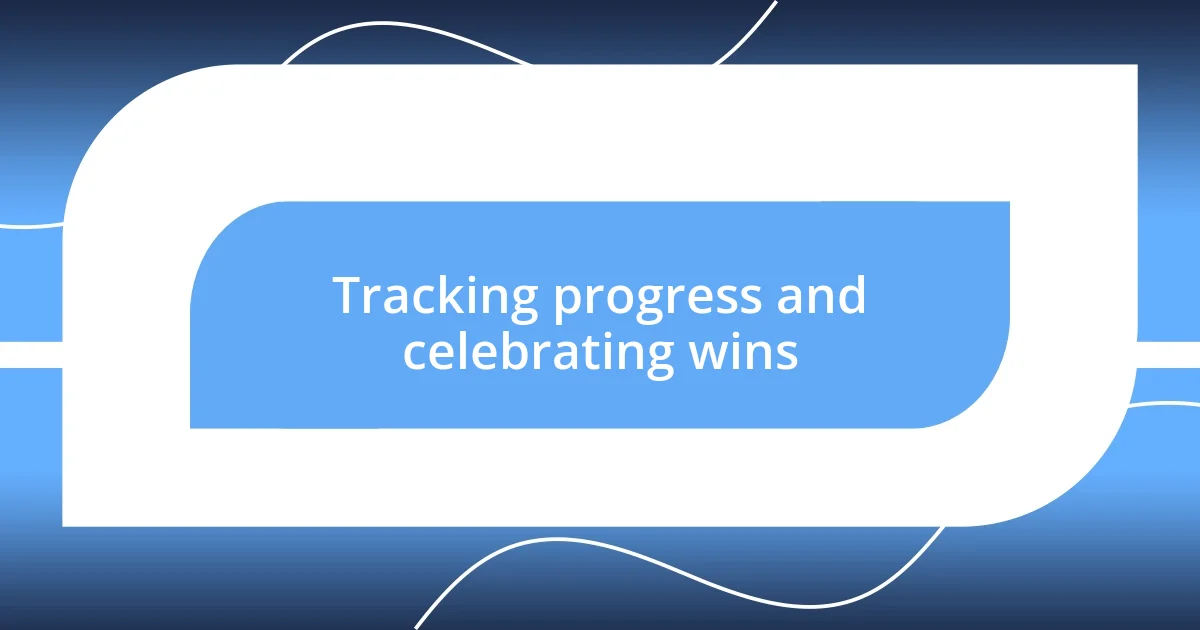
Tracking progress and celebrating wins
Tracking my progress in coding has been an enlightening experience. I made a habit of documenting my daily coding sessions, including what I learned and challenges I faced. It’s fascinating how much clarity comes when you glance back at your entry from a week ago. Remember that moment when a piece of code clicked, and you suddenly felt a surge of confidence? That’s the power of tracking—it transforms uncertainty into a clear path of growth.
As I marked milestones in my coding journey—like completing a complex algorithm or launching my first app—I began to celebrate those small victories. I recall treating myself to a nice dinner after completing a particularly annoying bug fix. It might seem minor, but those little rewards felt significant and reinforced my dedication. Isn’t it invigorating to acknowledge your efforts, no matter how small? Each celebration acted as a fuel, propelling me forward and reminding me that progress is worth recognizing.
Looking back, I also learned that sharing my achievements with friends and fellow coders amplified the joy of those victories. One time, I shared my excitement about finishing my first major project with my coding group, and their positive reactions made me realize how important community is in this journey. Have you ever shared a win and felt the energy lift around you? It’s like finding camaraderie in the struggle; celebrating together enhances the learning experience and keeps the motivation alive.





